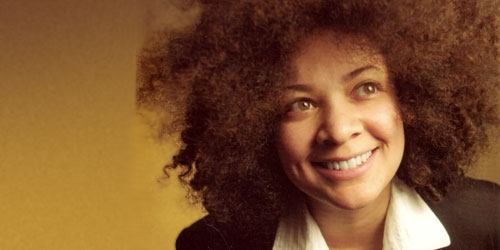
Curve Magazine has praised Pamela Means as "one of the fiercest guitar players and politically-rooted songwriters in the music industry today" – and ain't that the truth. The Brooklyn-based, internationally touring musician performs in East Lansing on Saturday, Nov. 13 during the Women in the Arts Festival.
We caught up with Means, who's performed several times previously in the area, about merging music with politics, growing up queer in a segregated city, and what she learned from Janis Ian.
You're known for integrating the fight for social justice into your performances. Why are you so passionate about these social issues?
My first girlfriend in Boston gave me bell hooks and Audre Lorde books, which brought into severe focus the pain and rage I had held inside growing up a biracial, queer kid in hyper-segregated greater Milwaukee. I began to write honestly about my own world, my true feelings and experiences, and about the world as I saw it. From then on, I committed myself to being honest and outspoken throughout my work, whether (it be) a song about governmental corruption or a love song to a woman. My life and identity is, by default, on the periphery, and so follows my work.
How does music play into social justice?
Music is a seductive way to introduce and inspire thought and action concerning myriad political topics. One can address serious subjects without climbing onto a monotonous soapbox. Clever lyrics can put a pointed sentiment behind a delicious groove that makes the medicine go down.
Which songs of yours, inspired by these issues, is especially important to you? And why?
"Two Halves" from the album "Single Bullet Theory" addresses sanctioned racial profiling, and "Amen," also from "Single Bullet Theory," personalizes the USA Patriot Act. My newest album, "Precedent," features a snapshot of Hurricane Katrina aftermath and a few love songs, including "Virago Plains" – with the proper pronouns intact.
You've shared the stage with lots of generation-spanning, queer female musicians, from Melissa Ferrick to Janis Ian. What have you learned from them?
I've learned a lot about engaging with the audience – especially touring for two years with Alix Olson! I used to be really shy and stare at the floor, but now I enjoy myself a lot more and I'm not afraid to speak up and tell stories and corny jokes. I was also particularly inspired by a Janis Ian workshop where she introduced using effects pedals with the acoustic guitar. I've never been the same since!











